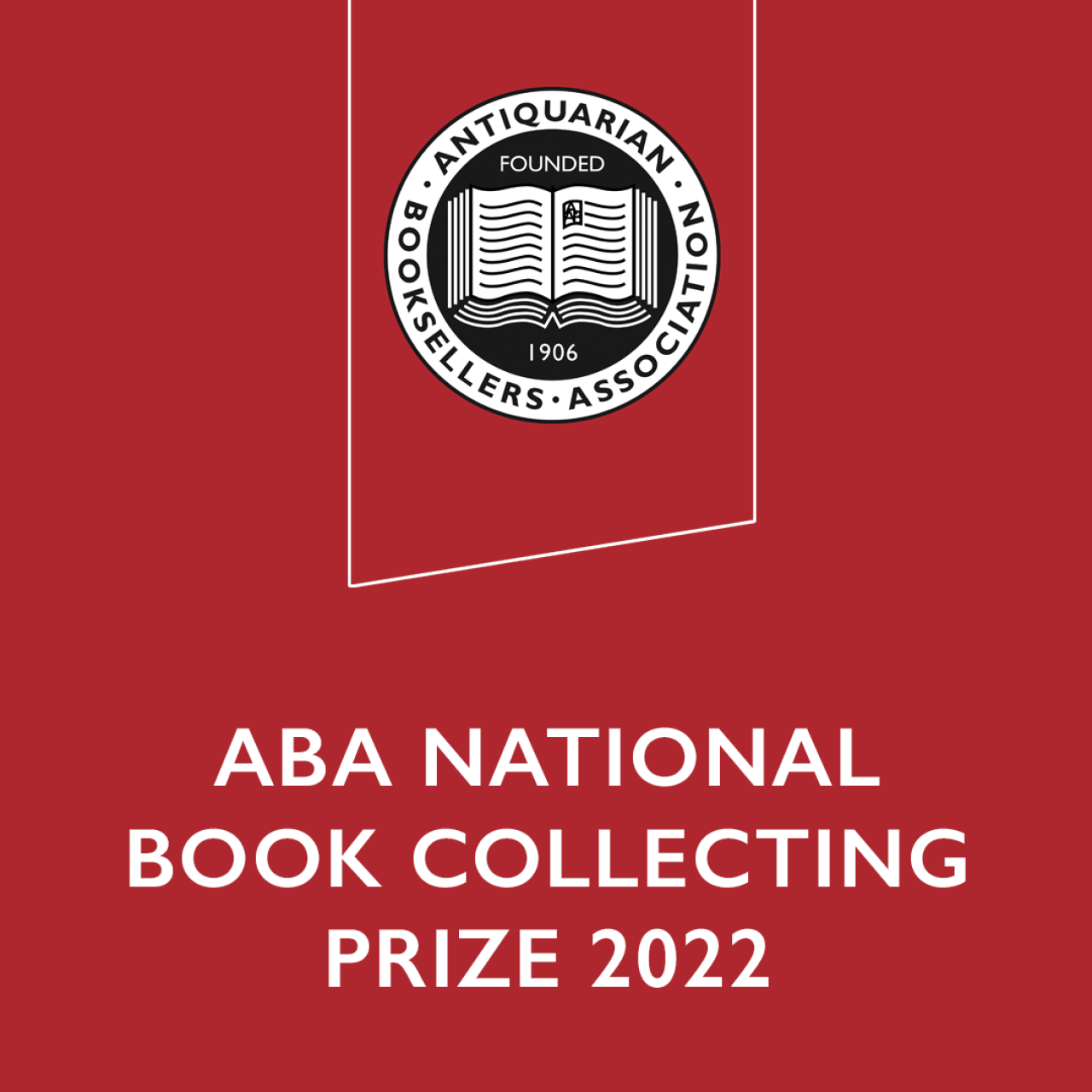ABA News
ABA National Book Collecting Prize 2022

ABA NATIONAL BOOK COLLECTING PRIZE 2022
If it is good enough for the Booker Prize - Joint-Winners Announced!
For the first time since the inception of the prize in 2016, we are delighted to announce that the 2022 ABA National Book Collecting Prize has been awarded jointly to Cambridge University student Joseph Bills for his Rose Prize winning collection Illustrated texts as living objects in eighteenth and nineteenth-century Japan, and to Hannah Swan, from London, for her entry Swizzle and Serve. Party Planning Books and Ephemera, the winner of the Anthony Davis Book Collecting Prize.
The panel of five judges were pleased to receive a number of high-quality entrants, and a lively discussion ensued, so much so that it proved impossible to single out one winner, the final decision instead being to award £500 to both Joseph and Hannah to expand their collections. The ABA Council kindly agreed to fund an additional £500 this year, so as to provide an award of £250 to both Cambridge and London towards a purchase from an ABA member for each University Library.

Joseph Bill’s fascination with, and passion for, Japanese illustrated texts ‘all started in a basement in Tokyo’, visiting the Union of Antique Book Sellers weekly sale of incomplete texts. ‘What interested me as I flicked through their pages was how, despite them being in this basement because of their supposed worthlessness, each one was unique. They had signatures of former owners, illustrations coloured in by children, covers that had been rebound after sale. I realised that I held more than just books containing stories and information, but books with their own material histories. These trips formed the basis of my collection’. With increasing attention being given to the materiality of the book, as well as to ownership and provenance, it was this real appreciation of the book as an object, and the important relationship between word and image, text and publishing medium which shone through. As Liam Sims, the Rose Prize Administrator, noted in his accompanying submission statement, Joseph is ‘both extremely enthusiastic and knowledgeable about the material, both from a cultural and material perspective, his collection shows that he is alert to the bibliographic value and variety of books that can be bought cheaply’ – a view very much shared by the ABA judging panel.

Hannah Swan charmed the panel with her exuberant collection Swizzle and Serve. Party Planning Books and Ephemera, 1950-1970, her entry perfectly encapsulating the bibliophilic joy that we all share from opening book parcels and boxes, and of the thrill of the chase for the rare and bizarre items. As she states in her essay, ‘Every collection begins with a mania, and I am a maniac for ephemera. I was an insatiable bibliophile at a young age, the only eight-year-old to bring a book collection to show-and-tell amidst a sea of Beanie Babies and Pokemon Cards. As I got older, I began to take more of an interest in the fringes of printed and paper matter, collecting ticket stubs, notes from friends, even interesting foreign packaging. It wasn’t until my MSc in Book History that I was able to put a name to my secret lifelong obsession—ephemera. And so my career, my passion, my life has come to revolve around those fragile detritus of the modern world. For me, ultimately, collecting is a social practice. Meeting other ephemerists through the British and American ephemera societies and fairs, swapping stories and ephemera alike, has been the high point of my career as a collector’. Comprised of over 100 pieces of printed ephemera and more than 30 books, Hannah is forming a unique collection, which she hopes will eventually serve as a research collection in the future, shining a light upon mid-century American social conventions and the intersections of sexuality and print culture. With plenty of scope for expansion, Hannah intends to push her current timeframe backwards, her goal is to amass a representative 20th century party-planning collection.
Both winners captured well the inspiration that drives all book collectors, displaying a genuine joy and exuberance in the collecting process, which particularly resonated with the panel. We feel sure that they will be on the collecting scene for many years to come. Congratulations from us all!
Particularly pleasing to the panel this year, was how culturally diverse the collections were, an encouraging sign. Other entries were received from students at Edinburgh on Roman and Anglican Liturgical Books; from Glasgow on Philippine Mythology Komiks; two entrants from Oxford on ‘Books with names: collecting previous owners’ and ‘Translation: Medieval & Modern’; and from St Andrews ‘A glimpse into the history and practice of South Indian Classical dance’. All the entries displayed great enthusiasm, erudition, and passion, with an appreciation of the various angles from which the books and collections can be viewed and enjoyed, be it textually, physically, politically, or visually. As ever it was very inspiring to see the upcoming generation of young collectors creating unusual collections, with limited means, yet revelling from the thrill of finding hidden treasures.
2022 ends the ABA’s current five-year commitment to the prize, though future funding options will be discussed by Council in the coming months. An award ceremony is planned for Firsts London in May, 2023.
The Judges are: Lisa Baskin, (collector), Deborah Coltham, Brian Lake, Laura Massey (booksellers) and Ed Potten (independent researcher formerly of Cambridge University Library).
